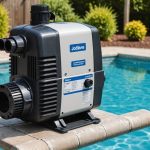Overview of Budget-Friendly Pool Heating Solutions
For UK pool owners, finding budget-friendly pool heating solutions is crucial to enjoying swimming while managing expenses. With the UK’s unique climate, fluctuating temperatures make cost-effective heating essential. Pool owners ideally need heating methods that both suit their budget and prove efficient in these conditions.
Numerous heating options are available, each offering distinct advantages. Solar covers, heat pumps, and electric heaters are popular choices, each differing in upfront costs, maintenance, and efficiency.
Also to read : Uncover the benefits of a variable speed pump for your uk backyard pool
In the UK, understanding the impact of local weather on pool usage is vital. The climate affects energy consumption and feasibility, guiding owners toward cost-effective pool heating strategies. For instance, heat pumps can offer efficient heating even with cooler UK temperatures, while solar covers harness solar energy, reducing the reliance on electricity.
These energy-efficient options allow homeowners to extend swimming seasons without incurring excessive costs. By evaluating factors like installation ease and long-term savings, pool owners can make informed decisions. Adopting solutions that align with personal usage patterns ensures warmth and enjoyment of pools throughout the season, optimising costs and comfort effectively.
Additional reading : Essential materials for building a durable and safe pool ladder in the uk
Solar Covers as a Cost-Effective Heating Method
Solar covers are a practical solution for pool owners seeking cost-effective heating options. These covers work by trapping heat from the sun’s rays, which naturally warms the pool water and reduces dependence on electricity. Besides heating, solar covers significantly decrease water evaporation, helping to retain heat and maintain the pool’s temperature efficiently.
When installing solar covers, ensure they fit snugly over the pool’s surface to maximise heat retention. Regular maintenance involves keeping the cover clean and removing debris that could compromise its effectiveness. Proper upkeep not only extends the lifespan of the cover but also enhances its heating capabilities.
In terms of cost analysis, solar covers are typically more affordable than other heating methods. They require a lower upfront investment and incur minimal maintenance costs. When compared to options like heat pumps or electric heaters, solar covers might seem less powerful, but their ability to harness free solar energy offers substantial savings over time.
While solar covers may not suffice during extremely cold spells, they are ideal for UK climates with variable temperatures and occasional sunny days. This makes them a favoured choice for maintaining a pleasant swimming temperature without breaking the bank.
Heat Pumps: Efficient and Budget-Friendly
Heat pumps are a standout choice for those considering energy-efficient pool heating. They operate by extracting heat from the air, utilising the ambient temperature to warm pool water. This method is not only innovative but also highly efficient, especially in mild UK climates. Though the initial investment in a heat pump can be higher compared to other options, the long-term savings on energy bills often justify the cost.
In terms of efficiency, heat pumps are known for their remarkable ability to maintain consistent water temperatures, prolonging the swimming season without causing a steep rise in utility costs. Their efficiency ratings, often depicted in Coefficient of Performance (COP) values, highlight their ability to generate more heat per unit of electricity used, making them a cost-effective choice over time.
When installing heat pumps in UK homes, attention to location and airflow is crucial to ensure optimal performance. Sheltered spots with good air circulation are ideal. Regular maintenance, such as keeping the evaporator coil clean, helps in preserving their efficiency. By understanding the operational requirements and benefits, pool owners can make informed decisions about integrating heat pumps into their pool heating strategies.
Comparing Pool Heating Options
Exploring various pool heating options can help owners make cost-effective choices tailored to their needs. Understanding the features and operational costs of solar covers, heat pumps, and electric pool heaters offers a comprehensive view.
Solar covers provide an economical option by using solar energy to trap warmth. They excel in cost-efficiency due to a low initial investment and minimal maintenance requirements. However, their reliance on sunlight makes them less effective during colder periods.
Heat pumps draw heat from the air, showcasing high efficiency in maintaining constant temperatures. Though they involve higher upfront costs, their long-term savings compensate by reducing energy expenses over time. For UK owners, heat pumps are advantageous due to their adaptability to varying temperatures.
Electric pool heaters are renowned for their rapid heating capabilities. They offer precise temperature control, ideal for short-term use, but tend to incur higher operational costs. Optimisation involves using them selectively to offset expenses.
Considerations of installation, maintenance, and overall efficiency guide decision-making. Understanding local weather patterns and pool usage further ensures an informed selection, optimising expenses while enhancing swimming experiences. Examining local case studies can reveal potential savings, enabling smarter solutions tailored to personal circumstances.
Electric Pool Heaters: Quick Heating Solutions
When it comes to affordable and quick heating options, electric pool heaters stand out. They provide rapid heating by using electricity to elevate the water temperature swiftly. This feature makes them ideal for pools needing intermittent heating, especially in the UK where spontaneous cooler weather can emerge.
Running costs, however, vary significantly due to fluctuating electricity prices and usage frequency. For regular users, the energy expenses can become noticeable, given their continuous electricity demand for rapid heating. To mitigate this, using the heaters selectively—such as only when necessary—can help balance costs and efficiency.
To achieve optimum performance, best practices involve ensuring the heater is appropriately sized for the pool, as an undersized unit may struggle to maintain desired temperatures. Regularly maintaining the heater, especially by cleaning filters and checking connections, is essential to sustain efficacy and extend lifespan. Additionally, incorporating a solar cover can aid in retaining the achieved heat, minimizing the heater’s operational time.
Consider the kind of heating experience desired; electric heaters offer unmatched warmth speed but require mindful usage to stay within budget. Together with other techniques for heat conservation, they form a comprehensive strategy for efficient pool heating.
Tips for Reducing Pool Heating Costs
Managing heating expenses efficiently is paramount for pool owners. Simple maintenance practices can significantly enhance heater efficiency. Regularly inspect and clean systems to prevent performance issues. Routine checks ensure components operate effectively, reducing unnecessary energy consumption.
Pool covers are invaluable for minimizing heat loss. When selecting covers, prioritise snug-fitting options to retain warmth. Combining covers with insulation techniques helps maintain consistent temperatures, especially essential in the UK’s variable climate. Consider using solar blankets or liquid covers to accentuate heat retention.
Proactively adjusting heating routines according to local weather can further optimise costs. Monitoring forecasts allows for flexible use of heating systems, reducing operation on warmer days. Harnessing natural elements improves energy efficiency, benefiting both the environment and your pocket.
During colder months, lowering the pool’s thermostat by a few degrees can lead to significant energy savings without compromising usability. When paired with seasonal weather changes, these practices provide both economic and environmental benefits. Employing a strategic approach towards pool heating not only aids in reducing expenses but also fosters a sustainable swimming experience.
Implement these strategies to effortlessly control costs while maintaining enjoyable and comfortable swimming conditions throughout the year.
Conclusion and Next Steps
As UK homeowners consider pool heating, recapitalizing on key points is crucial for informed decision-making. Evaluating extraction methods, such as heat pumps or solar covers, ensures efficiency and reduced costs. Practical steps, like adding pool heaters, represent an investment in both comfort and utility.
For further exploration, homeowners can turn to local experts or online sources to better understand regional climate impacts. This collective knowledge aids in customizing solutions to specific needs, aligning with budgetary constraints. Engaging with community forums or pool enthusiast groups may also provide valuable insights and recommendations.
Ultimately, choosing the right heating solution revolves around individual pool usage and environment. For example, those utilizing their pool frequently in the evenings may benefit from quick-heating options like electric heaters. In contrast, daytime users could find value in solar covers that harness natural sunlight.
Experiencing a journey into efficient pool heating calls for a thoughtful analysis of various aspects. With an array of options, each presenting distinct advantages, UK homeowners are well-equipped to navigate the path to a warmer, more enjoyable swimming experience. Take the time to review relevant resources, tailor choices, and optimise the perfect blend for personal pool enjoyment.




